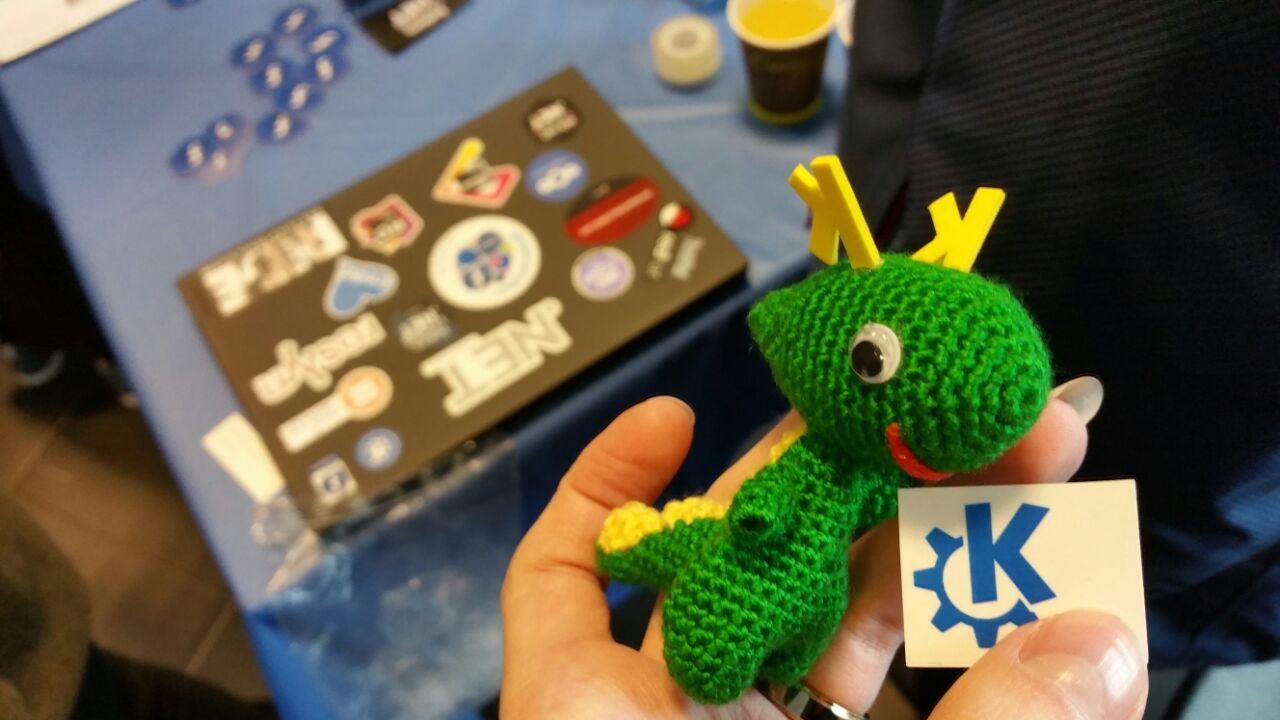
KDE & Sour Pineapple
“We cannot condone the use of Bitcoin”

Flash back to the not so distant past -2018:
“KDE is immensely grateful for this donation. We would like to express our deeply felt appreciation towards the Pineapple Fund for their generosity. We will use the funds to further our cause to make Free Software accessible to everyone and on all platforms. The money will help us realize our vision of creating a world in which everyone has control over their digital life and enjoys freedom and privacy.”
so said Lydia Pintscher, President of KDE e.V.
What was this generosity? No less than 27 bitcoins (BTC)! At the time an astounding donation worth approximately 200,000 USD! Not bad! Nate Graham who has been tirelessly campaigning for donations to fund developers of late would be happy with this sort of philanthropy in 2023, would he not?
Fast forward to the present – 26th of February 2023 on Birdsite @decentralized_b writes:
Hey @kdecommunity, I love your work. Don’t you plan to open your donations to #Bitcoin and/or #LightningNetwork? You should!
“Well, it already does, fellow KDE lover!”, I say to myself! I am thinking he must have missed the option on the donations page. I do remember it not being very obvious, so I go to the KDE website to find it and help a KDE brother out. Alas, I cannot find the option for cryptocurrency donation anymore. Huh?
When were cryptocurrency donations removed from the donations page and seemingly dropped?
I am an avid follower of all things KDE (as well as cryptocurrency) and check my RSS feeds almost religiously – but did not see any news regarding this. Searching the website and net gives me no results either. Of course, it is ridiculous to expect KDE to open up discussion on all things to the community. There are no doubt many trivialities that would bog an organisation down were consensus always sought, nor do we need a tyranny of the masses, -but this I would argue is a significant change, for reasons I will expand upon. Some may disagree, but it is certainly not as trivial as, say, changing the font type on the KDE website.
The KDE Manifesto states as its first listed value:
Open Governance to ensure engagement in our leadership and decision processes

Given this primo value, I suggest it would have been appropriate to consult the KDE community on such a decision, be that in a forum or even putting out a poll. Please correct me if I missed this opportunity to voice an opinion on how or if cryptocurrency should integrate with KDE!
Sliding back into Birdsite to explore the thread further, I read the following from the official KDE social media profile- @kdecommunity (nb. who is in charge of this social media profile though is unclear).
“..we cannot condone the use of Bitcoin under any circumstances, much less for donations to us.”
Interesting and quite a stark authoritative statement. Bitcoin, notably, is an Open Source technology. KDE’s Mission is to “promote the Free and Open-Source ecosystem”. Such a declaration would certainly seem to be at odds with KDE’s Mission statement! We should look to the reasons on why this technology would be exempt.
The @kdecommunity account explains:
The environmental impact of Bitcoin is disastrous: https://en.wikipedia.org/wiki/Bitcoin#Environmental_effects
At KDE we actively work on reducing the carbon footprint of software through our KDE Eco project: https://eco.kde.org/
Indeed, ‘Sustainable Software’ was selected (through community consultation) as one of ‘3 overarching goals to focus on over the next couple of years’.
The goal is about sustainability of software and efficiency. Commendable goals! After all, who wants software that is unsustainable or inefficient – if only for the ‘selfish’ reason that it saves you money!
The goal however does NOT mention ‘reducing the carbon footprint’ as the @kdecommunity channel claims. Of course this distinction will irk some people who conflate the concepts, but it is quite possible people voted on this goal solely for the stated measures of sustainability and efficiency. It is important to be clear and I mention this as the other statement by @kdecommunity also needs investigation in this respect.
The @kdecommunity channel also states, “The environmental impact of Bitcoin is disastrous” and points to a wikipedia entry.
@decentralized_b then posits a question:
And one of the most important questions that not many people do is: does energy consumption correspond to carbon footprint?
IMO, there is a big difference between how much energy one consumes and how much carbon emissions one emits.
Indeed! Hass McCook, a civil engineer, who has written extensively on this topic, notes:
Bitcoin is a rounding error in the global scheme of things, and from a carbon-intensity point of view, has significantly less emissions per kilowatt than finance, construction, healthcare, industry or the military, and will only improve further in time. My prediction still stands: Bitcoin’s carbon intensity will go from 280 g CO2 per kWh today, to around 100 g in 2026, and zero by 2031, and maybe, finally, we’ll be done with this debate.

Milton Rodríguez – Educación Cripto @MiltonRodM chimes in to reflect this idea:
Todos hablan de la energía que consume Bitcoin pero dejan de lado la energía que se consume en las finanzas tradicionales, o qué, la infraestructura que los bancos tienen, no cuenta? Dejar conectados aparatos sin usarlos, consume inclus, más que Bitcoin.
Everyone talks about the energy that Bitcoin consumes but leaves aside the energy that is consumed in traditional finance, or what, the infrastructure that banks have, doesn’t count? Leaving devices connected without using them consumes more than Bitcoin.
There is plenty of literature and studies that contest both the inefficiency as well as carbon footprint of cryptocurrency. The consensus if far from settled. On top of that not all cryptos are equally energy drawing. Blocking all cryptocurrency donations on this basis is a carpet bombing approach, as @levynoise appears to suggest:
Greener alternatives exist. PoS enables participants to maintain their **chain by depositing holdings in a pool. When the second-largest .., Ethereum, switched from PoW ->PoS earlier this year, its energy consumption dropped by more than 99.9 percent overnight.
@decentralized_b also notes, “And Bitcoin is using more and more green energies.” It would seem that like KDE, Bitcoin too, has a goal of sustainability and efficiency!
Others in the thread, such as Pacman@Roesti14 and @btclama also point out government fiat currency’s relationship to oil and war – the most truly environmentally destructive event possible. Here I would like to quote Ron Paul, from his book End the Fed
“It is no coincidence that the century of total war coincided with the century of central banking.”
This topic is a much bigger subject than can be covered here, but if you are advocating for government fiat currency over cryptocurrency, be it for energy use or morality, then to say the absolute very least, ‘if you live in a glass house don’t throw stones’!
All this discussion about environmental concerns however is moot! Yes, KDE has the sustainability goal -a goal set for a couple years, but the criteria upon which cryptocurrency should be accepted or rejected lies in the timeless higher order principles of KDE! Namely, the KDE Manifesto, Vision and Mission. It is these things that define the community, as I have stipulated before here.
I am curious as to how many in the community have read these documents. I would not be surprised to discover the number to be relatively low. Why? There is no ‘About’ section on the kde.org website, which is where such documentation would generally be found. There is a footer and this, thankfully, does contain a link to the Manifesto. It does not contain links to either the Mission or Vision statements however! There are incidentally links to both the KDE Goals and Code of Conduct. The footer on community.kde.org pages contain no links for any of the above.
I return to the point that KDE’s Mission is to “promote the Free and Open-Source ecosystem”.

The ecosystem overall certainly does embrace this open source technology, be it Linux Podcasting with its Value for Value model, or paying for a Linux VPS with bitcoin, to open source browsers and video platforms using crypto tokens, to organisations like the Free Software Foundation (FSF) accepting donations in bitcoin and Litecoin! In this respect to not accept cryptocurrency appears to be a clear violation of its mandate and a seemingly insular rejection of the open source ecosystem -is it not?
What else lies in the three core documents that would provide clarity and direction?
The Mission statement says:
- gives users full control over which information about them or their behavior is ever collected or transmitted
It is simply not possible to avoid handing over information when using government fiat and the proprietary banking system. The Mission statement also has this about privacy.
- provides usable security and privacy features to protect against surveillance and data theft
The Vision also reinforces the importance of privacy:
Privacy: In a world where our privacy is increasingly threatened, we wanted to emphasize its importance. Freedom without the right to privacy is no freedom at all.
In terms of payment with privacy the only option, apart from the impracticality of sending cash in the mail, is to use cryptocurrency! Bitcoin of course is pseudo-anonymous, but there are others with complete privacy like Monero, Zcash or even Dash private send.
In the KDE Vision statement we have:
A world: we recognize no geographical barriers to our work.
Cryptocurrency recognises no geographical barrier or borders – unlike permissioned fiat gateways. One tweeter in the thread points out that his country censors and controls payments.
smr.seddighy Man please don’t talk like that. As someone that lives in a country that is sanctioned by lots of other countries we don’t have access to any international payment system so Bitcoin and crypto currencies are a great way for us to do transactions.
Control: KDE has always aimed to put people in control. We don’t want to hand over control to anybody else: not to some service providers; not to some hardware vendors; not to governments; not even to KDE. KDE wants to put you in the driver’s seat.
The @kdecommunity lists something along the lines of taxation being an issue ‘and rightly so’. Apologies, as I cannot give the direct quote, as the @kdecommunity channel has now seen fit to block me! This @kdecommunity declaration and decision appears to put government interest as well as the service providers of the banking industry foremost, rather than putting ‘people in control’.
The Vision statement also states privacy:
Privacy: In a world where our privacy is increasingly threatened, we wanted to emphasize its importance. Freedom without the right to privacy is no freedom at all.
Again, if you wish to participate in funding KDE privately then cryptocurrency is the only realistic option.
Inclusivity to ensure that all people are welcome to join us and participate.
Does not ‘all people’ include those of the Open-Source cryptocurrency community – especially if they are also KDE community members? It would appear not – at least according to the @kdecommunity Twitter account!
@tuxpizza like myself also got a taste of @kdecommunity ‘inclusivity’:
I made a tweet challenging their viewpoint on Bitcoin/crypto as a whole and they blocked me, what a joke.

His crime looks to be this tweet:
“We will gladly take mass inflated, controlled, centralized, and surveillance dollars giving fees to evil companies like PayPal and Visa instead of open and decentralized for-the-people currency because it uses some energy” Guess what, FIAT uses way more energy than crypto
A little bitey perhaps but hardly offensive!
What of the reasons for not accepting cryptocurrency? Thankfully, Nicolás Álvarez
@nicolas09F9 was able to answer some of my questions (rather than block me).
One of my questions was regarding the acceptance of cryptocurrency previously. KDE used Bitpay – a third party payment provider. In doing so, I would imagine this was in order to convert cryptocurrency into euros. This would make it easier for taxation concerns no doubt, making me wonder what @kdecommunity’s objection was. Regarding the Pineapple Fund:
KDE used a Bitcoin payment service that transparently converted the Bitcoin into Euros. Had to do several bureaucratic steps to get the account verified to the level required to accept $200k. It was kept up for other people to donate until the account was blocked with no notice.
It does appear to still be live: bitpay.com/990273/donate/– but according also to @kdecommunity it is not working.
Nicolás Álvarez also adds:
The foundation accountant strongly adviced against accepting cryptocurrency directly.
So part of the issue here appears to be bureaucracy, yet I cannot help wondering if personal ideology also factors into the decision. Shutting down conversation/censoring without cause seems to suggest this.
It may be inconvenient and perhaps difficult to organise payment gateways, but surely the largess that would be lost is more important?
Other people may not be The Pineapple Foundation but they are willing to donate:
@btclama I will also like to donate in btc, decentralized censorship-resistant people’s money, rather than dirty obey cantillionares war fiat money :). let us know when u change your mind
Francisco (Pako) Verdeja@frverdeja
I would like to add @gnome
to the conversation because they don’t accept Bitcoin either, they only accept donations via card or Paypal, I would gladly donate if I could do it with Bitcoin over Lightning.
Many other organisations accept cryptocurrency. If the FSF can then why not KDE? That said, I am not savy on the regulations in Germany. Perhaps it is just too onerous?
Considering the KDE Manifesto, Vision & Mission there is no clear reason why cryptocurrency should be relegated to being ‘not condonned’, nor the Open Source crytocurrency community rejected and blocked particularly when this is a bonus source of funding for projects and developers.
Find new accountants and council if necessary. To ignore cryptocurrency is a head in the sand tactic.
I implore the KDE community to look to its binding principles to ensure inclusion, reconsider accepting bitcoin and do an audit of its social media relations in order that its core principles are upheld.
Barking Bandicoot

BTC greatfully accepted!
18iZhiJ745snneAxfFB5dUQfT9dvMPvw9W
https://manifesto.kde.org/index.html
https://community.kde.org/KDE/Mission
https://community.kde.org/KDE/Vision
https://kde.org/code-of-conduct/

Thanks for your blog post. It’s interesting to know that KDE was already receiving donations in Bitcoin, and they have stopped doing so. I didn’t know that.
As I said in my thread with them, I don’t intend forcefully convince anyone, but being a technical community focused on open source. I expected more from them.
A decision based simply on saying that Bitcoin’s carbon footprint is terrible, but without solid bases as to whether Bitcoin’s energy consumption actually produces a high carbon footprint, leads one to believe that they have not done their homework and have just accepted the general pitch to avoid red tape when switching Bitcoin to Fiat.
They haven’t considered the fact that more and more possibilities are opening up to create a circular economy using Bitcoin.
Sad to see they haven’t done the homework.
Lack of homework – and perhaps personal politics colouring the decsion also?
Thanks for the comment!
Sometimes I don’t understand KDE, this case reminds me of what happened with Roman Gilg’s KWinFT fork, they rejected his help because he didn’t follow certain principles even though his code was fabulous and solved many problems.
Interesting. I do not know about that one. To me though this is a case of KDE not following its principles rather than rejecting others for not following them.
Thanks for the comment. I will try and look up your example.
Some comments:
> Given this primo value, I suggest it would have been appropriate to consult the KDE community on such a decision
Open Governance does not mean that all (important) decisions are made by a “poll” or discussion with the community of KDE users; it means that any user can freely join the decision-making KDE communities. As an example, you can join the Fundraising community, where I’d guess this was discussed.
> @kdecommunity (nb. who is in charge of this social media profile though is unclear).
It’s only unclear if you don’t check! It’s the promo group of KDE (which, btw, you can freely join; again that’s Open Governance).
> they rejected his help because he didn’t follow certain principles even though his code was fabulous and solved many problems
That’s very much not what happened. Even if the code was “fabulous and solved many problems”, if it goes against the design architecture of KWin and the author does not want to collaborate with the other developers then that’s a no-go.